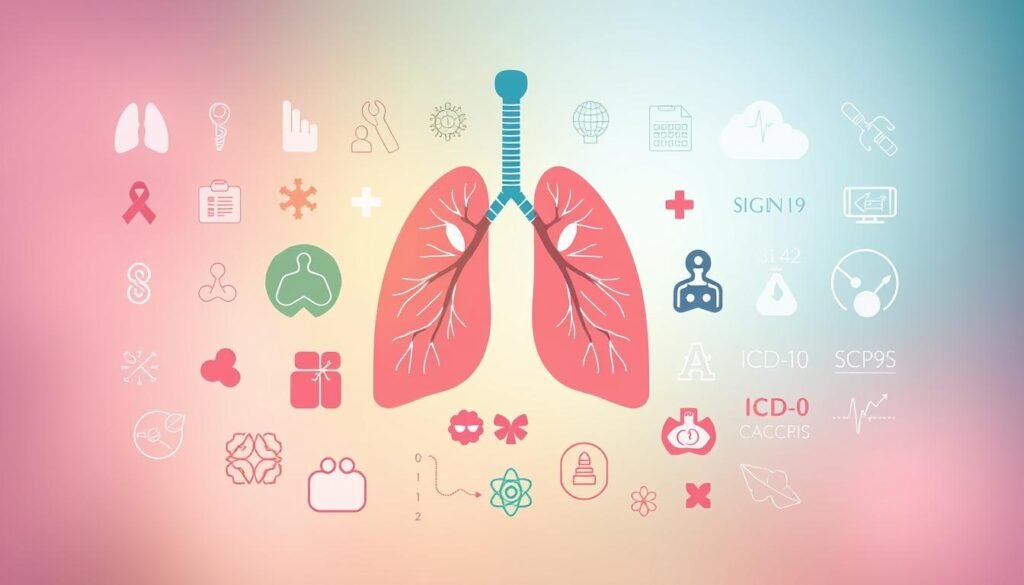Did you know that people who beat head and neck cancer are 3.71 times more likely to get lung cancer later? This fact shows the tight link between a patient’s past lung cancer and today’s ICD-10 codes. Knowing about personal history of lung cancer ICD 10 matters a lot. It helps doctors plan treatment right and deal with medical records and insurance.
Good record-keeping of lung cancer history lets doctors care better for patients. For those who’ve had cancer, looking back at their medical history is tough. It’s full of emotional highs and lows. They face the fear of cancer coming back. In this guide, we’ll explore more about ICD-10 codes and their role in treating lung cancer and helping survivors.
Key Takeaways
- Understanding the personal history of lung cancer is crucial for effective treatment and care.
- The ICD-10 coding system helps ensure adequate documentation for patient history.
- Head and neck cancer survivors have a significantly increased risk for subsequent lung cancer.
- Accurate health records assist healthcare providers in tailoring individualized care plans.
- Emotional and psychological challenges often accompany a lung cancer diagnosis and treatment.
Understanding Lung Cancer and Its Impact
Lung cancer is a major challenge in medicine today, touching many lives. It comes in two main types: non-small cell (NSCLC) and small cell (SCLC). Knowing about these types is key to tackling the disease. Each type needs a different treatment plan. This greatly affects how patients recover.
Overview of Lung Cancer Types
Most lung cancer cases, about 85%, are NSCLC. SCLC makes up a smaller part but is more severe. Each type has its own risks:
- Non-small cell lung cancer (NSCLC): Grows slower, often discovered late.
- Small cell lung cancer (SCLC): Grows faster, harder to treat due to its quick spread.
Lung cancer’s impact spreads far, affecting patients and their families. Spotting it early can lead to better outcomes. This highlights the need for more education and awareness.
Importance of Early Detection
Finding lung cancer early is critical. The American Cancer Society says early discovery can make treatment more effective. Watching for signs like a lingering cough, weight changes, or breathlessness is vital. Luckily, screening has gotten better, letting doctors find lung cancer sooner. Early detection is crucial; it helps lower death rates from this cancer.
Learning about smoking risks and quitting can improve health and reduce lung cancer risks. To learn more about tobacco’s link to lung cancer, visit this resource.
What is ICD-10?
The ICD-10, or International Classification of Diseases, 10th Revision, is key in medical classification. It lets healthcare providers classify and code many health issues, like lung cancer. Using ICD-10 codes makes data more accurate. This accuracy helps with reporting, studying diseases, and planning treatments.
Purpose of the ICD-10 Coding System
The ICD-10 system aims to organize diseases and health conditions in a structured way. It helps in gathering and studying health data for doctors and researchers. Its main goals include:
- Standardization of health information across different institutions
- Facilitating statistical analysis regarding the prevalence of diseases
- Supporting healthcare quality control and reimbursement processes
- Assisting in the determination of treatment protocols based on specific conditions
How ICD-10 Affects Lung Cancer Diagnosis
The ICD-10 coding system has a big impact on lung cancer care. Accurate codes are crucial for good patient results and team communication. For example, the code Z85.29 indicates a history of certain lung diseases. It started on October 1, 2024. This helps doctors plan better follow-up care for lung cancer patients.
Coding plays a vital role in keeping good health records for lung cancer care. It’s crucial for the ongoing treatment of patients.
| ICD-10 Code | Description | Effective Date | Exempt from POA Reporting |
|---|---|---|---|
| Z85.29 | Personal history of malignant neoplasm of other respiratory and intrathoracic organs | October 1, 2024 | Yes |
| Z85.9 | Personal history of unspecified malignant neoplasm | October 1, 2024 | Yes |
Personal History of Lung Cancer ICD 10
The ICD-10-CM code Z85.1 is for people who had lung cancer before. This code is key for tracking a patient’s past with lung cancer. Doctors use it to make better choices for treatment and care.
Understanding the Code Z85.1
Z85.1 means someone had lung cancer in the past. It tells doctors about the patient’s health struggles. Knowing a patient’s history with this code helps tailor their care. Cancer documentation resources give more info on lung diseases.
Importance of Documenting Personal History
Recording a history of lung cancer is critical for patient care. It informs doctors about needed screenings or care plans. It also helps create tailored care plans that keep past cancer in mind. This focus on detailed history can improve a patient’s life quality.
ICD-10 Codes Related to Lung Cancer
It’s important to know the ICD-10 codes for lung cancer for correct diagnosis and treatment. We will look at two key codes: Z85.1 and Z85.118. Using the right code helps in patient care and lets healthcare providers track the illness better.
Code Z85.1 for Personal History of Malignant Neoplasm
Code Z85.1 is used for a history of cancer in the bronchus and lung. It lets healthcare workers know about past lung cancer, so they can watch for it coming back. Having Z85.1 in a patient’s history helps choose treatments and plan follow-ups.
Code Z85.118 for Other Malignant Neoplasms
Code Z85.118 is also for a history of cancer, but in other parts of the bronchus and lung. This code starts on October 1, 2024. It fits into several groups including 826, 827, 828, 829, 830, 843, 844, and 845. Z85.118 doesn’t need to be reported at admission, making it easier for healthcare workers while still keeping detailed patient records.

| ICD-10 Code | Description | Effective Date | POA Exempt | DRG Classifications |
|---|---|---|---|---|
| Z85.1 | Personal history of malignant neoplasm of bronchus and lung | Effective October 1, 2014 | Yes | 826, 827, 828, 829, 830, 843, 844, 845 |
| Z85.118 | Personal history of other malignant neoplasm of bronchus and lung | Effective October 1, 2024 | Yes | 826, 827, 828, 829, 830, 843, 844, 845 |
Managing a Personal History of Lung Cancer
Dealing with lung cancer history means focusing on follow-up care and staying healthy long-term. It’s vital to have regular check-ups, screenings, and lead a healthy life. Being alert helps catch any new issues early, which means they can be dealt with quickly.
Importance of Follow-Up Care
Follow-up care is key for those who’ve had lung cancer. Seeing healthcare providers often helps keep track of how you’re doing and spot any changes. It also means you can talk about any new symptoms quickly. Knowing the signs of respiratory diseases helps patients notice problems early and get help right away. By going to all your appointments, you can get better results from your recovery.
Managing Long-Term Health Post-Diagnosis
After a diagnosis, the goal is to live healthily for a long time. Making good lifestyle choices, like eating well, exercising, and not smoking, is crucial. Regular health checks are also important to find out about any issues early and see if your treatments are working. Plus, focusing on managing stress and getting mental health support can make your life better and help you face future health issues strongly.
Lung Cancer Survivorship
The journey of lung cancer survivors has highs and lows after they finish treatment. Survivorship includes many experiences. These impact their physical, emotional, and social well-being. Knowing about life after lung cancer treatment offers hope and clarity.
Life After Lung Cancer Treatment
Post-treatment, lung cancer survivors might face health challenges. It’s crucial to have regular check-ups. These check the cancer’s return and manage side effects. While many report better health, some still have symptoms needing care.
Emotional healing is key for survivors. They often feel anxious about their cancer experience. Using mindfulness, therapy, and support groups can boost their emotional strength.
Support Systems for Lung Cancer Survivors
Good support systems are essential for survivors after treatment. Support groups create a community for sharing and encouragement. They also offer coping tips. Getting professional counseling helps with mental health and emotional wellness.
Informational websites and cancer organizations offer great support. They provide education, advocacy, and social events. This ensures survivors are not alone. Connecting with others in similar situations increases a feeling of belonging. It shows survivorship is a journey shared by many.

| Support System | Description | Benefits |
|---|---|---|
| Support Groups | Peer-led gatherings offering shared experiences | Emotional support, community building |
| Counseling Services | Professional therapy sessions for emotional healing | Address anxiety, provide coping strategies |
| Educational Resources | Information on survivorship and health management | Empowerment through knowledge |
| Advocacy Programs | Organizations supporting lung cancer initiatives | Promote awareness, support research funding |
Common Concerns for Lung Cancer Survivors
Lung cancer survivors face many challenges. These challenges impact their lives in multiple ways. Knowing about these issues can improve the support and care they receive.
Physical Health Implications
After treatment, survivors deal with several health problems. Chronic breathing issues significantly lower life quality. Treatment side effects can include:
- Breathlessness during regular activities
- Increased susceptibility to lung infections
- Chronic cough or changes in lung function
Survivors should follow a care plan for their lung health. Addressing physical health issues helps maintain overall well-being.
Emotional and Mental Health Considerations
Lung cancer survivors often struggle with their emotional health. Anxiety and depression are common due to their experiences. This emotional toll may lead to:
- Long-lasting fear of cancer recurrence
- Feelings of isolation or loneliness
- Difficulties in adjusting to life after treatment
It’s important to seek professional help for these emotional challenges. Therapy and support groups help survivors cope better. Mindfulness and physical activity are also beneficial.
Survivors need to care for their physical and emotional health. Personalized care plans and professional help are key to thriving after treatment. Self-care also plays a crucial role in health outcomes.
Using resources such as accurate documentation practices can help manage long-term health implications. This ensures survivors get the right support.
The Role of Thoracic Oncology in Lung Cancer Care
Thoracic oncology is key in handling lung cancer care. It focuses on diagnosing and treating different chest tumors. This area aims to boost patient results with customized treatments. Recent progress shows specialized care is essential for effective lung cancer management.
Understanding Thoracic Oncology
Thoracic oncology takes a team approach. Surgeons, oncologists, and radiologists work together. They focus on lung and chest cancers. Their work ensures accurate diagnosis through proper imaging and staging. Experts in this field are always learning and researching. This helps improve lung cancer treatments.
Advancements in Treatment Approaches
The way we treat lung cancer has greatly changed. New methods like targeted therapies and immunotherapy have bettered patient outcomes. These approaches aim at the cancer while protecting healthy cells. Also, clinical trials offer access to the latest treatments. This gives hope for more personalized care.

In short, thoracic oncology boosts lung cancer care with its specialized knowledge and new treatments. Ongoing research and progress are making a big difference. They help raise survival rates and improve life quality for those with lung cancer.
| Treatment Type | Description | Target Group |
|---|---|---|
| Targeted Therapy | A treatment that targets specific genetic mutations in cancer cells. | Patients with identifiable mutations. |
| Immunotherapy | A treatment that boosts the body’s immune response against cancer. | Patients with advanced lung cancer. |
| Chemotherapy | A systemic treatment that uses drugs to kill cancer cells. | Patients at various stages of lung cancer. |
| Surgery | Procedure aimed at removing tumors from the lungs. | Patients with localized tumors. |
| Radiation Therapy | Using high-energy rays to kill or shrink cancer cells. | Patients with inoperable tumors or residual disease. |
Cancer History Documentation Best Practices
Keeping good records of cancer history is key for getting the right medical care quickly. It’s not just helpful for doctors making choices, but also affects insurance. Up-to-date records mean better care quality.
Importance of Accurate Documentation
Getting the facts right is a must in healthcare. It stops mistakes during billing and when insurance companies check the details. Recording if cancer is current or in the past helps code it right. Knowing if treatment is going on now or it’s a history matter guides care plans.
Who Should Keep a Cancer History Record?
Keeping a cancer history involves everyone. Patients should note their treatments and any health changes. Doctors need to make sure records are right and full. They work with coders to follow rules. Family helps by collecting information. Everyone’s input makes sure nothing is missed.
Life with Malignant Neoplasm of Bronchus and Lung
Being told you have a malignant neoplasm in the bronchus and lung changes everything. It affects work, social life, and how you feel every day. This condition not only harms your body but also your mind and emotions. Knowing what to expect helps in dealing with these challenges.
Impact of Diagnosis on Daily Life
Everyone faces different obstacles when living with lung cancer. However, some issues are quite common:
- Physical Limitations: Feeling tired and having trouble breathing can stop you from doing what you love.
- Work Adjustments: Sometimes, talking to your boss about making changes at work is needed.
- Social Dynamics: How you connect with friends and family might change as you look for support.
It’s important to understand the emotional side of this diagnosis too. Anxiety and not knowing what will happen next can be hard. Taking care of your mental health is just as important as looking after your body.
Creating an Individualized Care Plan
Making a care plan that’s just for you is key in battling a malignant neoplasm. It means treatments and help are chosen based on what you need and prefer. What’s important in this plan?
- Medical Treatments: Pick treatments that work best for you and your daily life.
- Nutritional Guidance: Eating right helps you get stronger.
- Support Services: Talking to mental health experts and joining support groups offer well-rounded care.
Working together with your healthcare team makes sure everything is covered. Looking into the specifics of lung cancer, like through this informative link, helps too. This provides a clearer picture of your treatment and care plan.
Conclusion
Understanding lung cancer and its effects is crucial in healthcare today. The talk showed how vital correct ICD-10 coding is for classifying lung cancer. With a focus on the importance of documentation, it’s evident that complete medical records lead to better treatment and outcomes for patients.
After a lung cancer diagnosis, survivors must connect with support and resources. They need a forward-thinking attitude for managing health. Knowing more about lung cancer helps in discussing treatment, emotional health, and long-term care needs.
For both healthcare workers and patients, using detailed coding practices improves care. This is seen in the personal history of lung cancer ICD 10 Medical discussion. Thankfully, cancer support groups provide essential resources for impacted individuals.